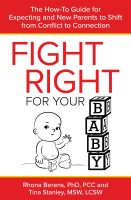While many of us once dreamed of having a family with our partners, once we had our children, we’ve spent so much time dealing with their needs, work demands, and day-to-day life, that we have had little or nothing left over; our relationships became secondary, even dispensable. For many parents, romantic relationships aren’t all that “romantic” anymore.
All of that said, research shows that, on average, parents with better quality relationships have better-adjusted kids. The poorer the quality of our relationships, the more negative the developmental outcomes for our children across a range of variables including physical health, academic success, and psychological and social outcomes. Compellingly, this holds true across race, ethnicity, and socioeconomics.*
How can we find time to cultivate a satisfying relationship when we barely have time to parent our kids?
By doing both at once or more precisely letting one outcome—good parenting, however, we define good parenting—follow from another: relationship fulfillment.
This sounds counter-intuitive in a culture where parenting is paramount. We hear that good parenting leads to healthy kids, bad parenting to developmental challenges. I’m over-simplifying, given that we’re encouraged, and rightfully so, to address “the biggies” first: risk factors like poor nutrition, homelessness, and physical and verbal abuse. But after we tackle those, we need only notice the vast number of parenting books, parenting experts, and parenting advice to determine where to focus our limited time and energy: on parenting, not relationships.
I think the importance of our relationship happiness to our kids’ well-being is possibly our culture’s best-kept secret.
I’ll never forget a comment made by Dr. Stephanie Coontz, Director of Public Education at the Council on Contemporary Families, at a ParentMap Conference in Seattle years ago. I was there to speak about the importance of expecting couples preparing their relationships for a baby. Coontz was there to give the keynote address. Here’s one of the things she said:
“Research shows that couples that attend a relationship class together report a more positive impact on their parenting than those who attend a parenting class together.”^
Mike drop.
The more parents cultivate relationship satisfaction with their partners, the greater the positive developmental impact on their kids.
For a compelling discussion about this issue–and the impact of prioritizing parenting on sex and intimacy in relationships–check out this great conversation between Esther Perel and Dr. Becky.
I don’t believe you have to be in a relationship to support your children’s health, or that all relationships are worth saving, or that all parents treat their relationships with spouses as secondary to parenting.
I do believe, however, that for most parents raising kids with a partner, improving your relationship with each other improves your parenting. So how can you start?
Here are 3 quick tips that I offer the parents that I coach:
- The 10% Rule. Instead of brainstorming a big activity or gesture that might enhance relationship fulfillment, something that demands 100% effort on your part—e.g., planning a romantic vacation without your kids—expend 10% of your precious energy to come up with something to do now, or soon, something you can make happen, e.g., a candlelit takeout dinner after the kids go to bed.
- What’s important to you about that? It’s a simple yet powerful question, especially when you disagree. Instead of rejecting your partner’s opinion, or making a case for why you’re right, pause, take off your “judgy” hat, and get curious about what they are saying. This is especially helpful even and especially when you’re convinced that you’re right and your perspective is vastly superior.
How can this question improve relationship happiness? If you get curious about what’s important to your partner, you’re more likely to avoid arguments and better understand their perspective. Fewer fights and greater mutual understanding usually lead to more warm and fuzzy feelings for each other.
- Get to the heart of the issue. Complaints and criticisms are like the hard candy coating that protects the chewy center of a tootsie pop (or maybe they’re more like the scab over a wound). Complaints and criticisms cover up what matters most. By focusing on your complaints—“you don’t help enough with the kids,” “you work too much,” “you never compliment me”—you further alienate your partner by pointing fingers and blaming.
By contrast, if you focus on the core of what’s upsetting you, the dream or wish that your complaints and criticisms point to—“I want us to be a parenting team” “l miss you and wish you were around more” “I’m feeling insecure and would appreciate your support to feel more confident”—then you’re far more likely to get your needs met and, failing that, to be better understood by your mate, not to mention yourself.
As great as these tips are, there’s no quick fix to relationship dissatisfaction and no one-size-fits-all way to maintain relationship fulfillment.
The good news is that devoting time and energy to improving and maintaining your relationship quality delivers payoffs for you and your kids.
So, if you need a “good parenting” excuse to rekindle the romance in your romantic relationship, and to reconnect with the partner with whom you dreamed of having a family in the first place, then do it for your kids.
*If you’re a research nut like me, search online for a Child Trends Research Brief entitled, “Parental Relationship Quality and Child Outcomes Across Subgroups,” to read about one study on relationship happiness and kids.
^Ideally, we’re able to devote time and energy to relationship fulfillment and parenting, as opposed to choosing one over the other. I try to read parenting books on topics pertinent to my family’s specific challenges, and my wife and I have benefitted greatly from the parenting tools we’ve learned from professionals, including a pediatric occupational therapist, a life coach, and a child psychologist.

Rhona Berens, PhD, PCC
Rhona is a Professional Individual & Relationship Coach who works with Leaders, Parents, Co-Parents, Couples, and Business Partners to increase relationship fulfillment and effectiveness in personal and professional Relationship Systems.
In addition to her work as a compassionate, fun and inspiring coach, Rhona is a skilled Speaker and Trainer. She delivers workshops to parents, birth professionals, educators, and teams. As an author, a recovering academic—Rhona was an Associate Professor at UC-Irvine for nine years—a former senior executive, and business consultant, Rhona brings a breadth of experience to her coaching.


